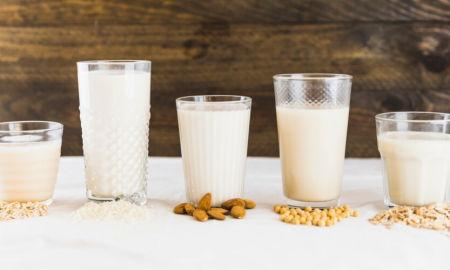
Experts Share Key Takeaways From Peanut Allergies in Children

Over the past two decades, peanut allergies in kids are on the rise and have caused great curiosity among the medical community. With more research being done to understand why, a lead researcher in the allergy field, Michael Pistiner, who is an M.D and also the father of a child with food allergies, shares his experiences with this deadly condition which affects almost one in thirteen children.

michellegibson/iStockPhoto | After much research, experts have come to the conclusion that delaying exposing your toddler to peanuts increases the risk of developing an allergy to it
If they aren’t exposed to peanuts when young, they’re likely to become allergic later
It’s a common misconception that parents should wait a few years before introducing their toddler to peanut butter, however, that’s completely untrue. After much research, experts have come to the conclusion that delaying exposing your toddler to peanuts (or any other top allergens of the sort) increases the risk of developing an allergy to it. Exposing children to peanuts via the skin and not through diet is the real cause of the recent rise in peanut allergies.
Peanut allergies only get worse with severe eczema
Normal skin acts as a healthy barrier and protects children against peanut particles; however, children with severe eczema don’t have such a strong barrier. The inflammation under the skin only adds to the allergies, due to which children with severe eczema are more likely to develop food allergies.
Get your child exposed to peanuts by 6 months
According to NIAID (National Institute of Allergy and Infectious Diseases), parents must introduce peanuts in their children’s diet as early as 6 months unless their baby has got severe eczema or an egg allergy. Between the age of 4-6 months is the ideal time to get your baby screened for peanut allergy.

Direct Media/CC0/StockSnap | Parents must introduce peanuts in their children’s diet as early as 6 months unless their baby has got severe eczema or an egg allergy
There’s no need to eat a lot of peanuts for protection
It has been recommended by NIAID that children eat 2 teaspoons of peanut butter or approximately 2 grams of peanut protein thrice a week until the age of five. This can be done by simply adding peanut butter to oatmeal, pureed fruit or even formula. Avoid giving peanuts as is to children under the age of four, for there is a risk of choking. Additionally, read the nutrition label at the back of a packed snack to check if they have the required amount of protein.
Introduce other food allergens too
Although it’s not officially out yet, there is evidence that early introduction to eggs will most likely prevent an egg allergy. It is safe to say that you can introduce your child to allergenic food at an early age.

CC0/PXHere | Although it’s not officially out yet, there is evidence that early introduction to eggs will most likely prevent an egg allergy
Peanut allergies are difficult to outgrow
Research has shown that children with a peanut or any other nut allergy have it for a lifetime. However, on the other hand, milk, dairy or egg allergies subside as children get older.
To sum it up
Even if your child has been diagnosed with a peanut allergy or any other allergy towards food, there’s no need to panic. With increasing advancements made in the medical field, new treatments are being created to help children with peanut allergies. However, experts advise following some of the above tips to curb the development of resistance to such substances in the future.
More inMedicare
-
`
How Often Should You Clean Your Yoga Mat? The Complete Guide
Cleaning your yoga mat might not always be top of mind, but it’s essential for your health and well-being. Whether you’re...
February 6, 2025 -
`
7 Common Blood Pressure Mistakes to Avoid for Accurate Readings
Managing your blood pressure is crucial for maintaining heart health, but many people unknowingly make mistakes when measuring it at home....
January 31, 2025 -
`
Types of Milk and Their Health Benefits – A Complete Guide
Milk has long been a staple in many households. Whether it’s poured over cereal, added to coffee, or simply enjoyed on...
January 25, 2025 -
`
Why the Keto Diet Is Not As Healthy As You Assume It to Be
The ketogenic (keto) diet is everywhere, touted as a game-changing plan for fast and effective weight loss. But is keto healthy?...
January 15, 2025 -
`
Are Press-On Nails Worth the Hype?
Getting the perfect manicure often requires a hefty investment of both time and money. However, if you’re looking to achieve a...
January 3, 2025 -
`
How Intense Exercise and Appetite Are Surprisingly Linked
Balancing physical activity and hunger can be challenging, especially when maintaining a healthy lifestyle or managing weight. Exercise is known to...
December 26, 2024 -
`
Our Brain: The Link Between Learning and Mindset
The brain is a complex organ that governs bodily functions but also shapes how we think and act. This interplay raises...
December 18, 2024 -
`
The Top 5 Benefits of Getting a Flu Shot
Getting a flu shot is more than skipping the sniffles. It protects your health in a big way. The flu vaccine...
December 13, 2024 -
`
How to Maximize Electronic Bike Health Benefits While Staying Safe
Electronic bikes, or e-bikes, offer an innovative way to enhance fitness while reducing the strain of traditional cycling. The health benefits...
December 6, 2024















You must be logged in to post a comment Login